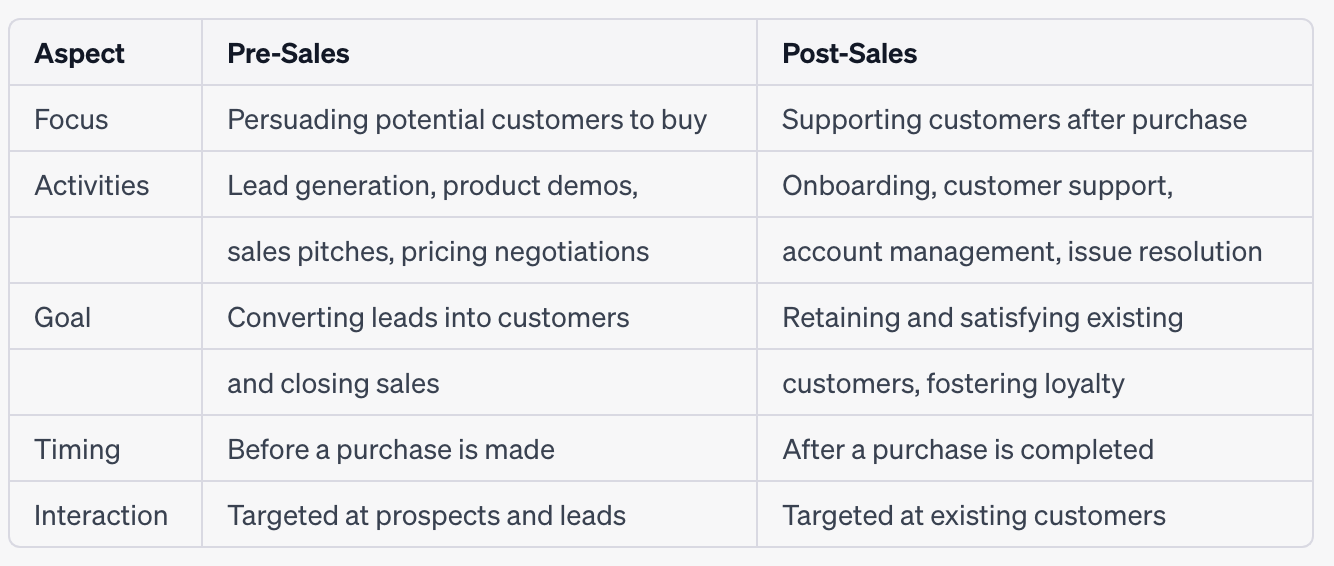Presales vs Sales and Their Blend - A Crucial Business Strategy
In the past, businesses could more easily define the limits of pre-sales and post-sales. In this day and age, however, there is no longer a clear line between the two. In fact, customer support centers are now being used in both pre-sale and post-sale capacities in order to handle customer needs and meet customer expectations more effectively, ultimately aiding in customer retention.
Customer support teams and sales teams have two converging characteristics:
Both groups have daily interactions with customers.
Both groups attempt to work independently of one another.
This necessitates a streamlined sales process to ensure efficiency and better customer onboarding. The presales team plays a crucial role in supporting the sales process by providing technical expertise, qualifying leads, and ensuring a smooth transition from prospecting to closing deals.
Number 2 above is a huge problem and frequently results in revenue loss for businesses that are attempting to scale. A well defined process for collaboration between sales, presales, and support teams is essential to avoid these issues and drive better results.
With the current sales climate, which emphasizes subscription-based services, there are tons of opportunities to upsell. Furthermore, customers can churn very easily when using subscription services. For these reasons, the collaboration between the sales and customer support teams within a business becomes even more pressing. A streamlined sales pipeline, supported by effective presales and sales collaboration, increases efficiency and conversion rates.
Teams accomplishing shared goals requires clear communication and defined responsibilities between sales, presales, and support to ensure success.
Introduction to Pre-Sales Process and Post-Sales
Pre-sales and post-sales are critical phases in the customer journey. The pre-sales experience involves activities like prospect research, qualifying leads, prospecting, lead qualification, and product demonstrations to persuade potential customers. The presales process also includes preparing proposals, conducting demos, and completing security questionnaires to address client concerns. The pre sales process includes offering product demonstrations and determining if an account qualifies for customer success managers or customer success engineers. The pre sales team is responsible for gathering feedback, designing solutions, developing proposals, and transitioning accounts from pre-sales to post-sales by introducing the Customer Success Manager for onboarding, implementation, and adoption. The presales team identifies prime prospects and supports the sales team throughout the presales process, ensuring that high-quality leads are nurtured and ready for sales engagement.
A presales engineer acts as a technical specialist, using advanced technical knowledge to address the technical aspect and technical features of the solution, ensuring it fits into the customer's tech stack and addresses the customer's pain points. Presales engineers handle parts of the sales process that involve advanced technical knowledge, and specialized training is required for these roles to effectively communicate complex information and support product integration.
Sales representatives and sales reps focus on building relationships, performing prospecting work, identifying clients, and developing customer relationships, while account executives handle deal closing and contract preparation after presales activities. Presales enables sales representatives by handling technical and initial sales tasks, allowing sales reps to focus on closing deals and customer support. Presales ensures sales representatives can focus on their primary job of building relationships and closing deals, while presales and sales responsibilities are clearly defined to improve efficiency.
Internal communication and presales collaboration are essential for a well-defined process and effective handoff between presales and sales teams. Comparing presales vs sales, presales focuses on technical evaluation, qualifying leads, and solution design, while sales is responsible for negotiation, relationship building, and closing deals—each with distinct roles, activities, and objectives within the sales pipeline.
Post-sales focuses on customer onboarding, support, and maintaining long-term relationships after a purchase. Both phases play pivotal roles in delivering value and ensuring customer satisfaction. Building relationships and maintaining an ongoing relationship are essential for long-term customer engagement and retention. These efforts are essential in fostering customer satisfaction by providing consistent and empathetic support throughout the entire journey.
These phases are complementary and crucial for a comprehensive customer experience strategy.

How IrisAgent helps in Pre-Sales and After Sales Support?
IrisAgent, an advanced AI-driven platform, plays a pivotal role in both pre-sales and post-sales activities. By leveraging its capabilities, it offers seamless continuity in the customer journey. IrisAgent can assist during pre-sales by providing real-time product information, answering queries, and facilitating product demos. Moreover, it continues to support customers post-sale by offering onboarding assistance, addressing issues, and providing ongoing product guidance through after sales support. This continuity ensures a smooth transition from pre-sales to post-sales interactions, enhancing the overall customer experience. Additionally, support teams can utilize customer data to improve service and predict future needs. IrisAgent bridges the gap between these phases, fostering customer loyalty and retention throughout the entire journey. The platform also helps define when and how the customer should be involved at each stage, ensuring a seamless and collaborative experience. This approach helps ensure customer satisfaction by addressing their needs promptly and effectively. Furthermore, it contributes to building long term customer relationships, encouraging repeat business and sustained engagement.
IrisAgent can help coordinate the efforts of sales and customer support teams. This coordination helps ensure sales by streamlining workflows and supporting both sales and presales teams.
When reaching out to a customer, support teams now need to have an in-depth grasp of the product and the business as a whole. Conversations between support teams and the customer need to be empathetic and knowledgeable in order to keep the customer’s business.
On the other hand, sales teams must gather specific information about customer priorities and top concerns in order to function effectively, meet their future needs, and potentially upsell.
Customer support teams should be sharing their valuable data with the sales team and vice versa. Improved communication and coordination between these separate yet related branches of a company lead to a better team effort in serving the customer.
When the customer feels as if she is a priority and has a consistent experience with different representatives of a company, she will continue working with the company. Thus, customer churn occurs to a lesser degree, and businesses are able to scale more easily.
Leveraging AI, such as that provided by , can help to connect these two related areas of your business. IrisAgent can also help sales teams craft a more effective sales pitch by providing real-time insights into customer needs and product advantages. Book a demo with IrisAgent today to see what we can do for your business!
Measuring Success and Performance
Measuring the success and performance of sales and presales teams is essential for optimizing the sales process and driving business growth. By tracking the right key performance indicators (KPIs), organizations can gain valuable insights into the effectiveness of their sales strategies and presales processes, ensuring that every stage of the sales cycle is aligned with business objectives.
One of the most critical KPIs is the conversion rate of qualified leads to closed deals. This metric highlights how effectively presales professionals are identifying and qualifying potential customers, and how well sales representatives are presenting the value proposition and addressing customer needs. Another important measure is the average deal size, which reflects the impact of technical validation and the ability of presales engineers to demonstrate technical feasibility and align solutions with the customer’s pain points.
The length of the sales cycle is another key indicator of efficiency within sales processes. A shorter sales cycle often points to strong collaboration between sales and presales teams, effective discovery calls, and well-prepared sales proposals. Additionally, customer satisfaction scores—gathered through surveys or direct feedback—offer insight into the quality of ongoing support and the technical expertise provided throughout the customer journey.
For sales reps, performance can be evaluated by tracking the number of discovery calls made, the quality and quantity of sales proposals submitted, and the effectiveness of negotiation tactics used to close deals. Presales teams, on the other hand, can be measured by the number of interactive demos delivered, the thoroughness of technical discovery, and the success of technical feasibility assessments in moving prospects through the sales funnel.
Leveraging data and analytics allows sales and presales teams to better understand their target audience, refine buyer personas, and tailor sales pitches to address specific customer needs. This data-driven approach also enhances product demos, presales responsibilities, and follow-up support, ensuring that prospective customers receive a seamless and compelling experience at every stage.
Ultimately, effective measurement and analysis of sales and presales activities empower organizations to identify areas for improvement, optimize resource allocation, and foster stronger customer relationships. By recognizing the interconnectedness of sales and presales functions and the importance of technical aspects in the sales process, companies can build a more collaborative sales department that supports continued growth and long-term success.




